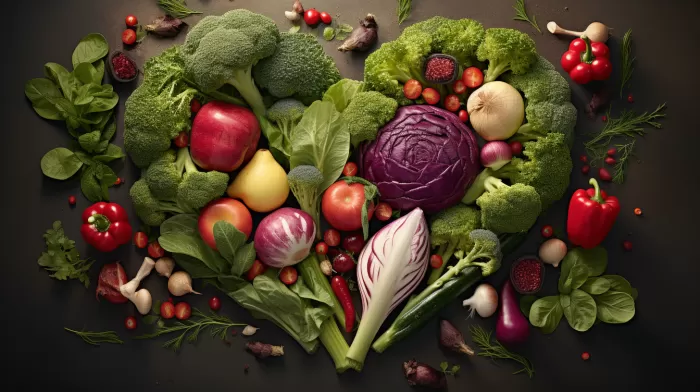It’s no secret that vegetables are good for your health… but exactly which are the best vegetables for men’s heart health (women can benefit, too!) — and why are they so beneficial?
It boils down to their amazing heart-protective nutrients.
But what if you’re a picky vegetable eater? No worries… here are some rules to follow when cruising the grocery isles to make sure you’re focusing on getting the best vegetables for your heart health…
- Choose vegetables that are nitrate-rich
Dietary nitrate, which is found in many vegetables such as beets, green beans, arugula, cilantro, rhubarb, basil, cilantro, Swiss chard and oak leaf lettuce, is a source for the production of nitric oxide (which occurs in your body). Nitric oxide is a molecule that plays several critical roles in protecting heart health. For example, it:
Helps relax and open up your blood vessels, which enhances blood flow and circulationSupports normal endothelial function. The endothelial cells are responsible for regulating the transport of materials of white blood cells into and out of the bloodstreamProtects your mitochondria, which are organelles in your cells responsible for energy production
It’s been shown that vegetables that help you produce nitric oxide can reduce your risk of age-related atherosclerotic vascular disease and death from all causes. Other research shows that eating lots of vegetables can help prevent and treat prehypertension and hypertension while also protecting against heart attacks.
In addition to these vegetables, one fruit is known for helping with this molecule as well: watermelon. This popular summer time fruit contains an amino acid called L-citrulline, which is a trigger that starts the process of improved production of nitric oxide. Watermelon also is a source of an antioxidant called lycopene, which can significantly reduce the risk of stroke.
For example, a study followed men in their mid-40s to mid-50s for more than 12 years to identify the effect of lycopene on stroke risk. The authors found that participants who had the highest lycopene levels in their blood were 55 percent less likely to experience a stroke than those with the lowest levels.
- Cruciferous vegetables should be in your fridge
Broccoli, cauliflower, cabbage, and other cruciferous vegetables are typically recognized for their anticancer properties, but they also provide heart-healthy benefits. For example, people who ate the most cruciferous vegetables (at least 3 servings daily) had healthier carotid arteries than those who consumed the fewest (2 servings or less), according to one study.
More specifically, people who ate the most cruciferous veggies had carotid arterial walls that were nearly 0.05 millimeters thinner than those who ate 2 servings or less. Because each 0.1 mm decrease in thickness is associated with a 10 to 18 percent reduced risk of stroke and heart attack, eating these vegetables seems to be rather significant. This association has not been found with other types of vegetables, according to the authors.
When you eat cruciferous vegetables you get a healthy dose of dietary fiber, calcium, potassium and vitamin K — all heart-helpful nutrients.
- Fermented vegetables act as a “heart antioxidant”
Perhaps the most common and popular fermented vegetable is sauerkraut, which provides lots of fiber and healthy bacteria (probiotics) that benefit the heart. For example, probiotic-rich sauerkraut can reduce inflammation, improve high blood pressure, lower triglyceride levels, maintain healthy cholesterol, and support gut health. Fermented cabbage also typically contains Lactobacillus plantarum, bacteria associated with boosting the activities of powerful antioxidants and ultimately aiding in detoxification.
Other fermented vegetables include:
YogurtKefirMisoTempehKimchiAny pickeled vegetablesKombucha
- Magnesium-rich vegetables relax your arteries
The mineral magnesium is intimately involved with more than 300 different enzymes that play roles in numerous biochemical processes. One of those processes is the creation of adenosine triphosphate, molecules that are responsible for energy production as well as relaxing blood vessels and muscles, including heart muscle.
Getting sufficient amounts of magnesium-rich foods is an important step toward supporting and maintaining heart health. Foods rich in magnesium include:
Dark green leafy vegetables (e.g., spinach, arugula, kale, collard greens, mustard greens, Swiss chard),Romaine lettuceBok choyBroccoliAvocadosSeedsNutsSquashBerriesWild Alaskan salmonCoriander, chives, and parsley, among others
If you can’t get sufficient magnesium through food sources supplementation may be required.
- Choose foods rich in quercetin
Topping the list of vegetables rich in quercetin are onions. Quercetin is a phytonutrient that has been shown to right inflammation and enhance immune system function. Supplementation with quercetin has demonstrated an ability to improve type 2 diabetes, circulatory dysfunction and obesity, as well as reduce the risk of atherosclerosis.
It’s believed that the more pungent the onion, the more health benefits it will provide. Those benefits may include prevention and reduction of cardiovascular diseases, normalization of triglyceride and cholesterol levels, and anticlotting properties.
Other vegetables (and fruits that contain quercetin include:
Apples and other citrus fruitsPeppersCherriesRed wineDark cherriesBlack and green teaTomatoes
Generally, including more and varied vegetables in your diet is good for your heart health. Salads, steamed vegetables, and vegetable soups are good ways to include more veggies, as are smoothies. Avoid frying and breading vegetables or adding fatty sauces.
Sources:
Blekkenhorst LC et al. “Association of dietary nitrate with atherosclerotic vascular disease mortality: a prospective cohort study of older adult women.” — The American Journal of Clinical Nutrition 2017 Jul 1; 106(1): 207-16
Blekkenhorst LC et al. “Cruciferous and total vegetable intakes are inversely associated with subclinical atherosclerosis in older adult women.” — Journal of the American Heart Association 2018; 7:3008391
Karppi J et al. “Serum lycopene decreases the risk of stroke in men: A population based follow-up study.” — Neurology 2012 Oct; 79(15): 1540-47
Mercola J. “Best vegetables for your heart.” — April 16, 2018



